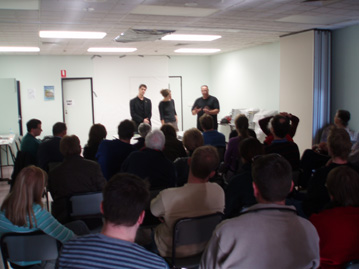Tonight’s Eastern Transport Coalition (ETC) meeting was attended by Terry Mulder, the Shadow Minister for Transport to discuss public transport issues within Melbourne’s east.
Terry Mulder as the Shadow Minister for Transport has been widely consultative and willing to engage community groups, councils and residents for the formulation of the Opposition’s Transport Policies.
With the State Government’s Transport and Liveability failing to address Melbourne’s public transport needs it is crucial that the State Opposition releases a comprehensive transport policy that will offer relief from rising petrol prices through substantially improving Melbourne’s public transport system.
Terry Mulder stated that he views public transport as a key issue for the State Election so the signs are encouraging. The recent announcement by the State Opposition to fund a detailed assessment of the long proposed Rowville rail line is a sign of this commitment and we hope that further announcements to address inadequate public transport will follow.
